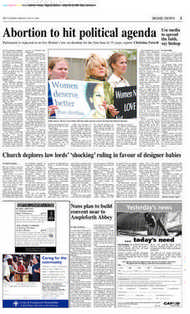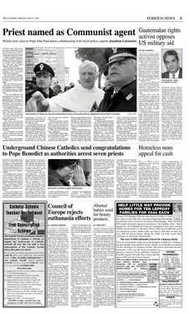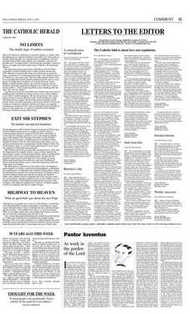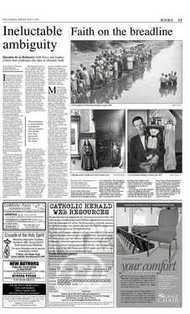Page 3, 6th May 2005
Page 3

Report an error
Noticed an error on this page?If you've noticed an error in this article please click here to report it.
Tags
Share
Related articles
Cardinal To Press Hewitt Over Abortion Limit
Campaigners Draw Up Battle Lines As Parliament Prepares...
Catholic Peer Criticises Parliamentary Inquiry , Into...
Seven In 10 Women Want A Lower Time-limit For Abortions
Continued Front Page I: To Believe In A Woman's Right
Abortion to hit political agenda
Parliament is expected to review Britain’s law on abortion for the first time in 15 years, reports Christina Farrell THE Government is preparing for a major review of abortion law, the first time in 15 years that the legislation will have been re-assessed.
The review follows recommendations made last year by the Science and Technology Committee to the Department of Health, but also reflects growing public disquiet at the ease with which an abortion may be procured in Britain.
An estimated 500 babies are aborted every day in England and Wales — nearly 180,000 a year.
Julia Millington, political director for the Pro-Life Alliance, said the committee had been very clear in its request.
She said: “They are asking that a joint committee of both houses be set up ‘to consider the scientific, medical and social changes in relation to abortion that have taken place since 1967’.
“Repeatedly, we are hearing that this recommendation will be adopted. The public and the pro-life groups will have ample opportunity to influence the outcome.” Senior figures in the medical profession have indicated that they believe abortion reform to be inevitable and now the pro-life movement is preparing its strategies to defend the unborn child. But there are also concerns that a change in the law could place even more babies at risk.
Paul Danon, spokesman for the Society for the Protection of Unborn Children, said reducing the upper time limit for abortion would mean simply that more babies are aborted earlier and that women and girls are placed under increased pressure to terminate their pregnancies.
“If the new parliament is as anti-life as the old, any legislation that is passed may make things worse, not better,” he explained.
“It doesn’t follow that just because a woman made a decision earlier, it was the right decision. We simply cannot be sure that a change in the law will reduce the number of abortions. We would be delighted in any reform that saves one unborn child’s life, but this may be a case of giving with one hand and taking away with another.” Abortion was an important issue in the run-up to the General Election with some pro-life activists deliberately targeting marginal seats where candidates were prochoice.
The UK LifeLeague, headed by Jim Dowson, sent out graphic images of aborted babies with the slogan “Liar Blair Supports Abortion” to over 90,000 homes.
“Abortion is an absolute affront to a decent society,” Mr Dowson said. “If this is so grotesque that it upsets us all, why, in God’s name, are we allowing it to continue?” But the increased militancy of some pro-life groups is tapping into widespread secular concern that abortion in Britain is carried out for “convenience”.
Last year the Anglican curate Joanna Jepson led national protests over the late abortion of a baby with a cleft palate. Abortion in Britain remains legal up to nine months if doctors believe the baby has a “severe disability” or the mother’s life is threatened. There are no proposals to end abortion up to birth in these circumstances.
Miss Jepson has already signalled her determination to make third trimester terminations illegal and maintains that, despite assurances of a review, “serious discrepancies” remain between what is being promised and the Government’s line on a woman’s right to choose. While any decision on abortion would be left to a free vote, a change in the law seems inevitable. Members of Parliament, across the political divide, appear determined that the upper-time limit of 24 weeks must be addressed.
Britain has some of the most liberal abortion laws in Europe and has become one of the abortion centres of the EU. Figures released last month show that 9,000 nonUK residents travelled to Britain in 2003 to have an abortion.
The 24-week upper time limit in Britain is twice as late as in France and Germany, yet advances in neo-natal care mean that babies can survive outside the womb from 22 weeks. Babies born at 24 weeks have a 40 per cent chance of survival.
In addition technological advances have proven, beyond doubt, the development of the unborn child. Last summer hi-tech images of a perfectly formed 12week-old foetus “walking” in its mother’s womb brought home the humanity of the unborn to many people who had previously supported abortion. The campaign has received support from unexpected quarters. Britain’s leading abortion provider, Marie Stopes International, which performs more than 60,000 abortions year, is backing calls to lower the limit to 20 weeks or earlier.
Ann Furedi, chief executive of the British Pregnancy Advisory Service, has also said “it is hard to see any argument against it”.
Nuala Scarisbrick, a trustee of Life, said she welcomed the review: “We would like anything that reduces the number [of abortions],” she said.
“Not only do abortions involve killing babies, but there are health risks for women too. The child in the womb needs to be protected.” Senior political leaders have already confirmed they are willing to amend the legislation. Michael Howard said he would welcome a lowering of the upper time limit to 20 weeks.
Charles Kennedy, leader of the Liberal Democrats, said he had previously voted for a 22-week limit but medical advances mean “I don’t know what I would do now”.
Those in favour of a review include the Liberal Democrat peer Sir David Steel, architect of the 1967 Abortion Act which set a time limit of 28 weeks for abortion. That was lowered to 24 weeks in 1990 and looks set to change again.
Ms Millington said the country was ready to raise the abortion debate. “It is time to take the battle back to Parliament where abortion was introduced in the first place,” she said.
blog comments powered by Disqus

















